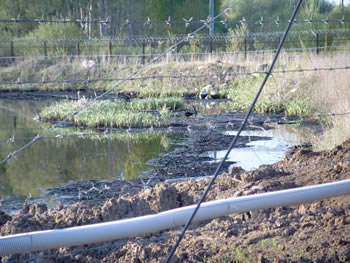Russia’s Worst Competitive Advantage
 Boris Kagarlitsky argues that Russian laws and practices are a threat to the planet
Boris Kagarlitsky argues that Russian laws and practices are a threat to the planet
Last month, when a freight trail derailed in the Tver region, spilling tons of oil, the media portrayed the accident as an environmental disaster of national importance. Yet oil spills are a regular occurrence and a major problem. According to data from Greenpeace, around 5 million to 10 million tons of oil is leaked in accidents similar to the one in Tver every year, more than anywhere else in the world.
For a country that lives off of black gold, we seem to have little problem throwing plenty of it away. However, it is not fair to chalk this up to good old-fashioned Russian slovenliness. A significant portion of the spills is the fault of foreign companies working in Russia. This summer, a rivulet of $60 per-barrel black liquid was discovered next to the Ryazan oil refinery, which belongs to TNK-BP. This company came into being when BP bought a 50 percent stake in the Tyumen Oil Company in 2003 in a deal worth around $7 billion, an example of the kind of large-scale foreign investment the Russian government is hoping to attract to the country.
A member of the global business elite, BP regularly underscores its concern for the environment. This doesn’t make things any easier for Ryazan residents, however. As with all good streams, the oil flows into a brook, the Listvyanka, from which it flows into the Oka River. The Oka provides the drinking water for the cities and villages downstream from Ryazan.
Nobody wants to take responsibility for the leak. After environmental activists began to make a stink about it, refinery representatives stated that the oil trickling out from under the factory’s fence had nothing to do with them. Instead, they insisted, its neighbor SFAT-Ryazan, which repairs railway cars, was to blame. Unsurprisingly, Igor Forostenko, the director of SFAT-Ryazan, angrily denied this: “This oil has nothing to do with us. It’s coming from outside our yard. Our property begins 400 meters away from the site.” Journalists and environmentalists who came to Ryazan tried to conduct their own investigation but were detained by guards who were proudly sporting TNK-BP’s logo. While the PR experts spin their tales, the oil continues to flow. Maxim Shingarkin, director of the Citizen Foundation, explained to BBC Russia that TNK-BP was paying little attention to the oil leak in Ryazan because it was “one millionth of what is spilled at the company’s West Siberian oil fields.”
Unfortunately, there is little reason to hope that the Russian authorities will take action against this apathy on the part of transnational corporations. In a country where enforcing basic laws often seems like a utopian dream, companies can easily shirk responsibility. Regardless of the rhetoric used at high-level forums, Russia’s lawlessness, combined with a general lack of civic responsibility, is one of the country’s main competitive advantages. In countries like Britain, under pressure from the public and under the scrutiny of the press, managers at transnational corporations are occasionally forced to dedicate some of their valuable time to protecting the environment. But why bother in authoritarian and bureaucratic Russia?
Nonetheless, environmental activists and concerned citizens are not giving up. If they cannot get satisfaction at home, they will take their battle on the road. “We are returning the oil we’ve collected to the managers of TNK-BP in Moscow and their colleagues at BP in London,” stated Semyon Zhavaronkov, a representative of the Anti-Corporate Movement, BBC Russia reported. Corporations may have crafted the mechanisms of economic globalization, but now they have to deal with rapidly globalizing protest movements.
In an ad for a certain detergent, the announcer notices that someone out there has yet to discover the wonders of his product. He turns to the camera and merrily yet menacingly exclaims, “We’re coming to your home next!” In many ways, this has become a slogan not only for those promoting transnational companies and their products. It has also become a motto for activists.







